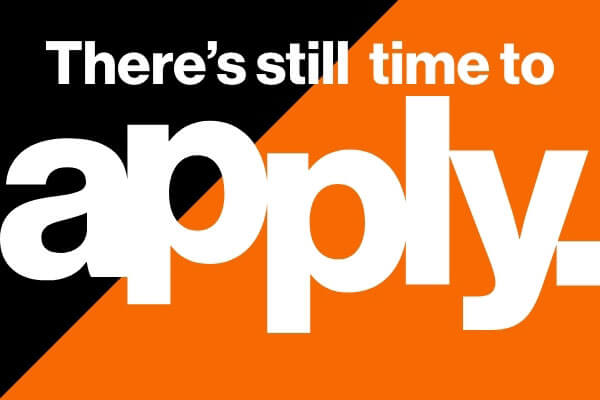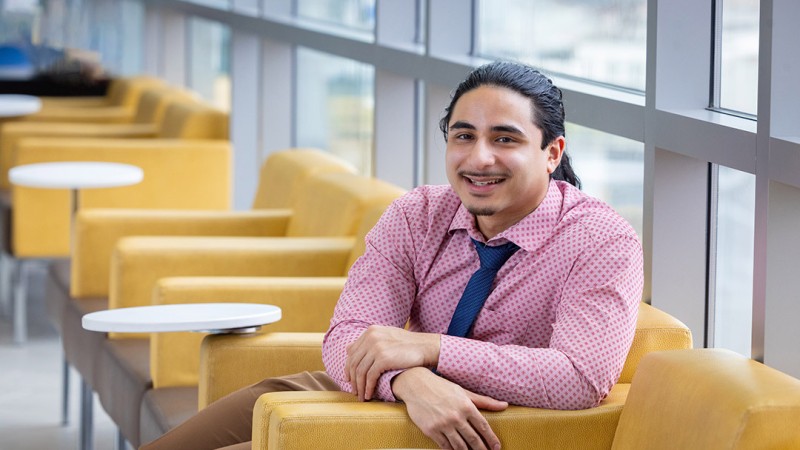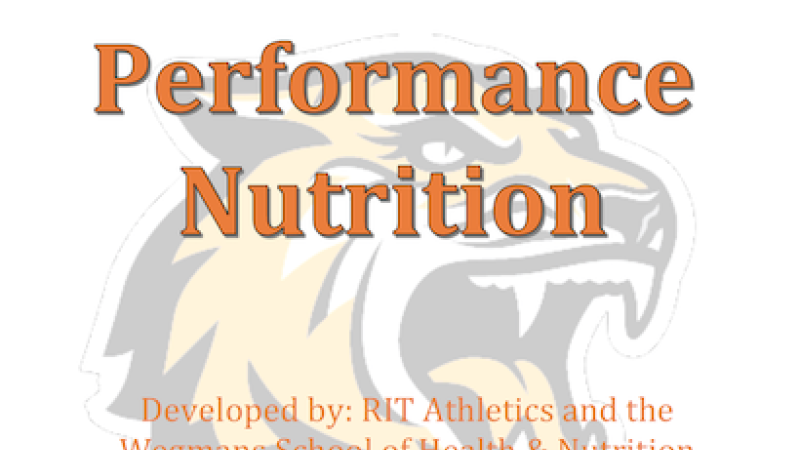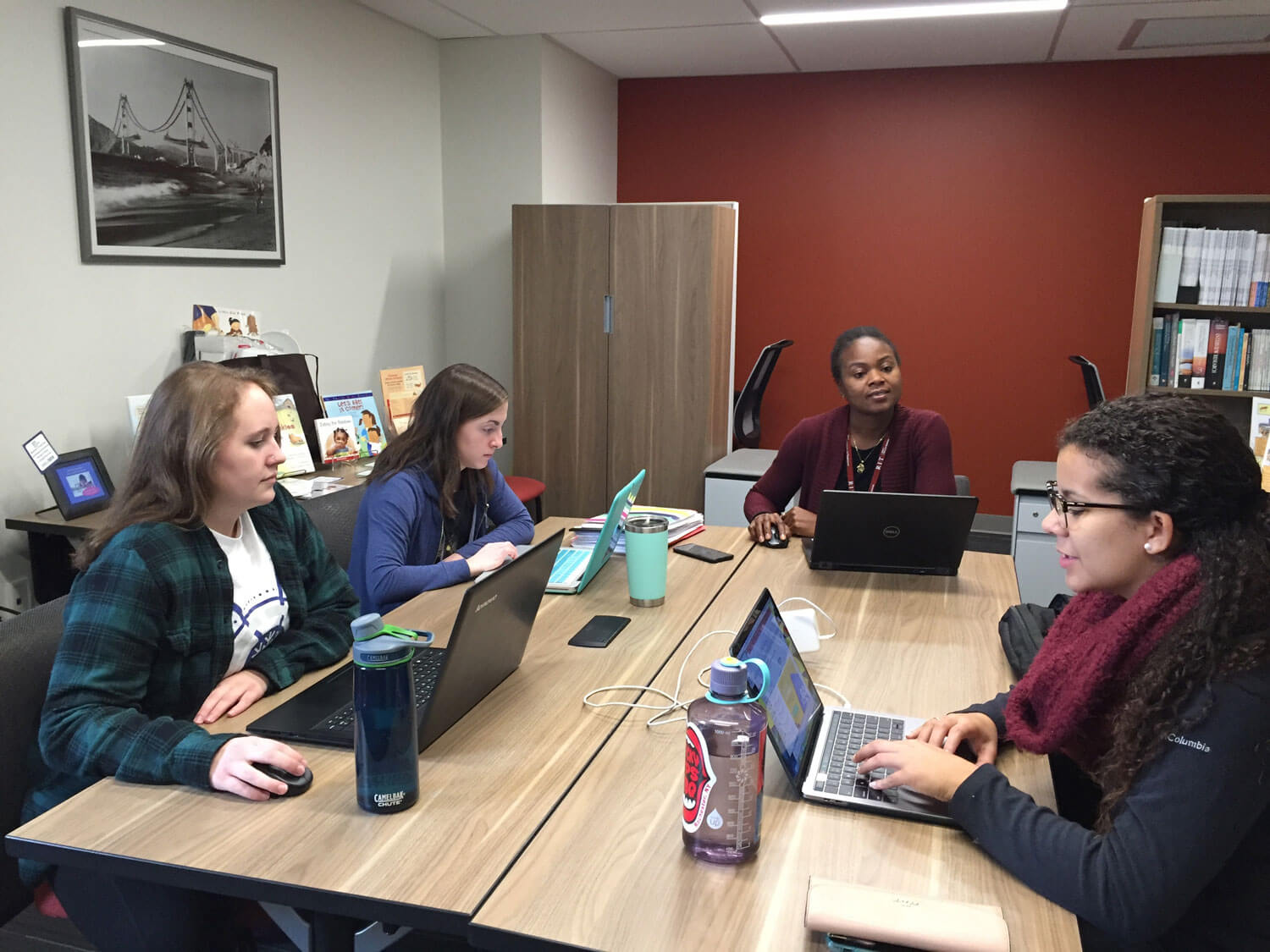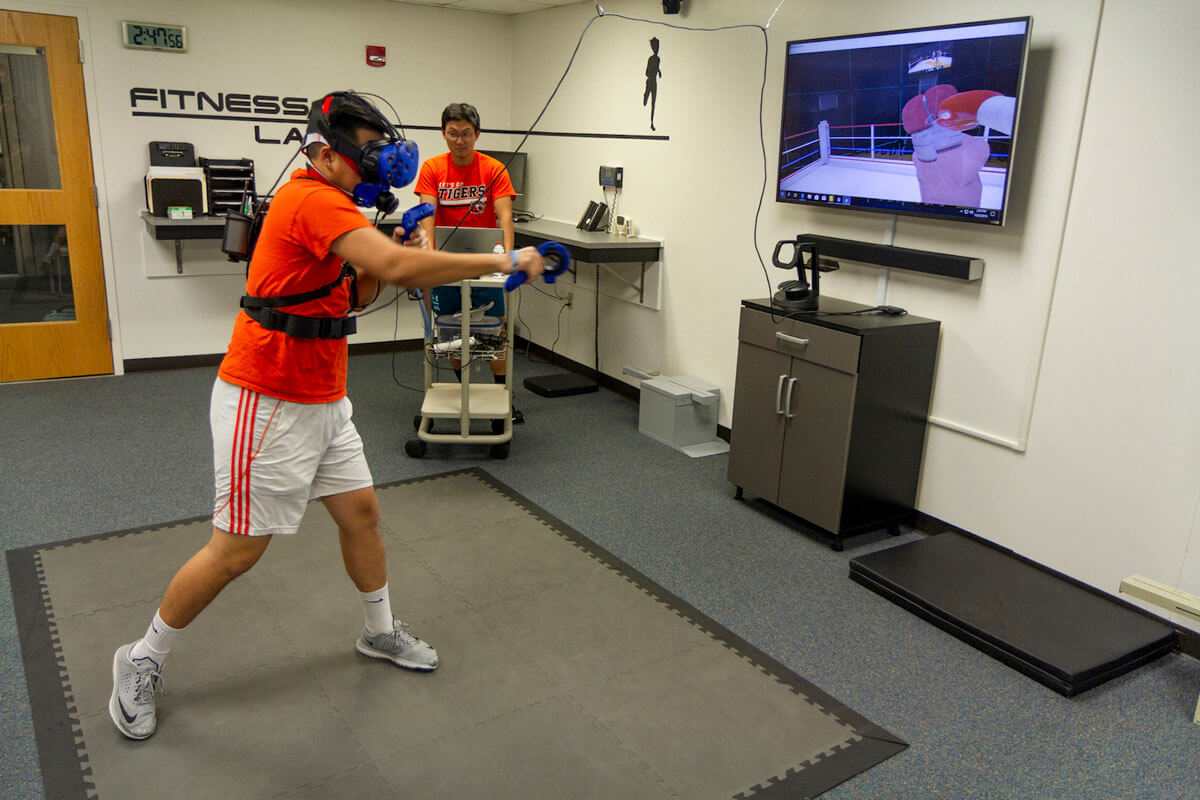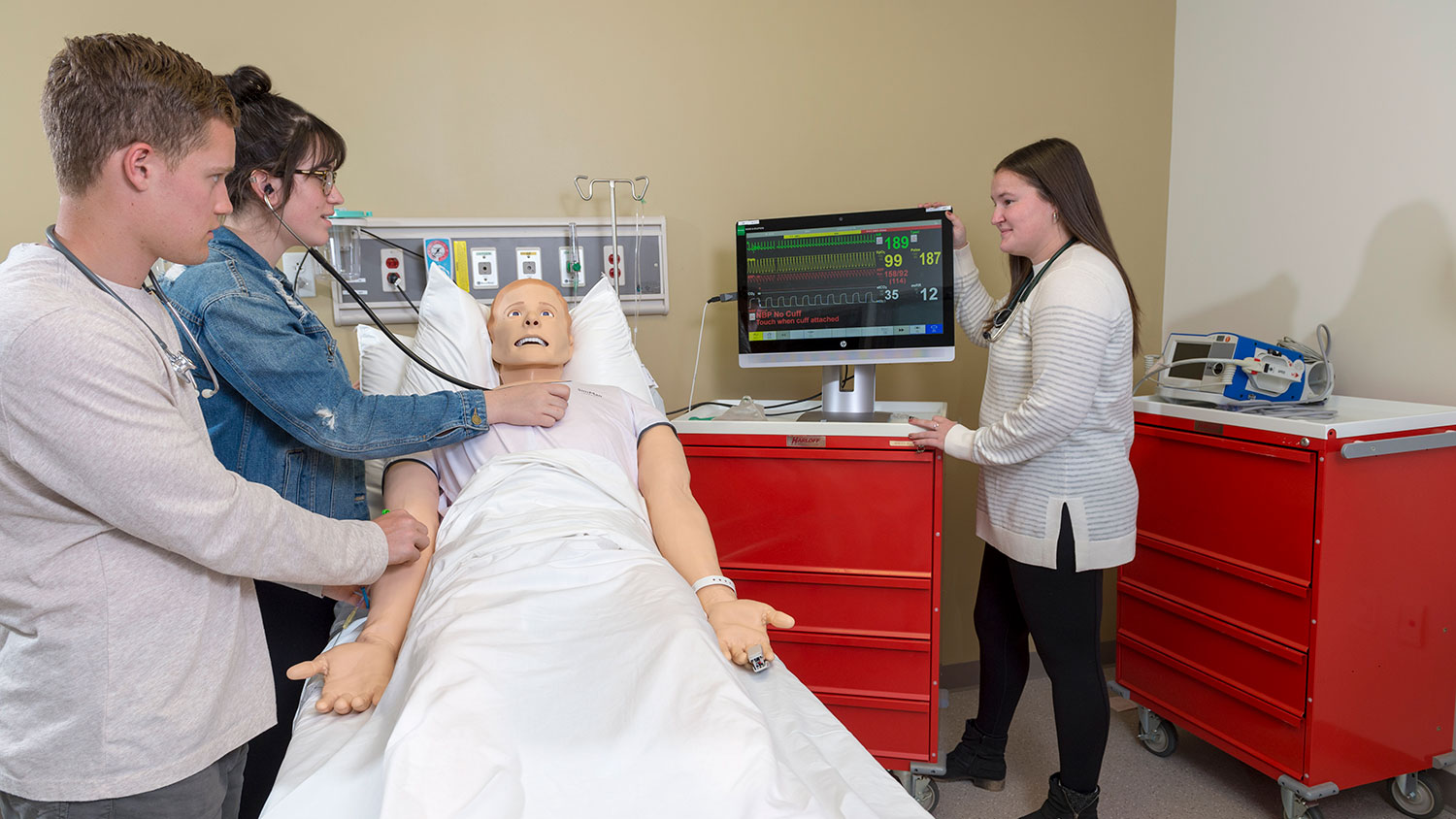Exercise Science Bachelor of Science Degree
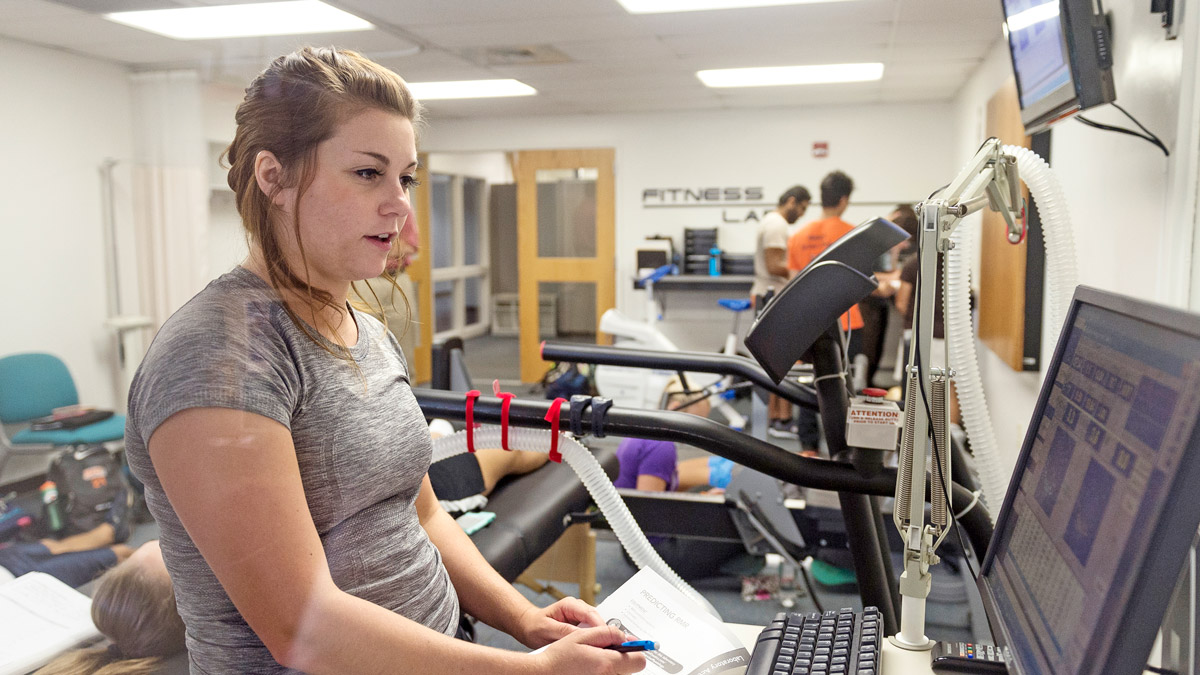
Exercise Science
Bachelor of Science Degree
- RIT /
- Rochester Institute of Technology /
- Academics /
- Exercise Science BS
Overview for Exercise Science BS
Why Pursue RIT’s Bachelor’s Degree in Exercise Science
Choose from two tracks: Focus your exercise science degree with a clinical track or an athletic track.
Prepare for Professional Certification: Students in the athletic track are prepared to achieve professional certification through the National Strength and Conditioning Association (NSCA) as a Certified Strength and Conditioning Specialist (CSCS).
An Excellent Pre-Med Major: Complete the required pre-med course work in biological and physical sciences while gaining human performance knowledge valuable to your future career in medicine or the health professions.
Combined Accelerated Bachelor’s/Master’s Degree Pathway: Combine your BS in exercise science with an MS in health and well-being management.
What is Exercise Science?
Exercise science is a discipline that studies movement and the body's responses and adaptations. The goal of exercise science is to broaden our understanding of the connections and benefits between fitness, exercise, nutrition, and health. It’s the scientific approach to understanding how exercise impacts the human body.
RIT’s Exercise Science Degree
In RIT’s exercise science major, you will learn to scientifically address issues of health and fitness as well as human performance as part of a rapidly growing field. Two tracks–clinical or athletic–enable you to select courses that focus on helping people recover from the unhealthy effects of a sedentary lifestyle or that focus on training athletes to extend and expand their capacity for exceptional human performance.
Comprehensive Exercise Science Curriculum
RIT’s exercise science major offers a challenging selection of exercise science courses that prepare you to understand the role exercise plays in both the enhancement of health and fitness as well as the improvement of athletic performance. You’ll gain an in-depth understanding of exercise, human movement, body systems, and the physiological concepts that are part of the human body’s physical response to exercise. The exercise science major offers a comprehensive curriculum that provides a solid foundation in exercise science as well as skills in leadership, communication, and problem-solving.
Choose From Two Tracks
Two tracks enable you to further refine your study of exercise science and tailor your degree toward your career goals.
Clinical Track: The clinical track is designed for those interested in using exercise as therapy. Clinical exercise medicine is an emerging field that is poised to grow as the population ages. This field is for students who see the opportunity to provide exercise/fitness services as an integrated medical service. You will be prepared to become the newest practitioner in the health care field. Clinical exercise physiologists perform fitness assessments, design exercise prescriptions, and implement therapeutic exercise programs for health promotion.
Athletic Track: The athletic track is for students who want to raise the bar of performance for athletes at all levels. A scientific approach to athletic conditioning improves performance while maintaining an athlete’s health. Athletic track courses allow you to learn how to better train and maintain athletes’ fitness and performance, especially those performing at intense levels of competition. Skilled strength and conditioning specialists are in demand at all levels of sport, and the prevalence of private-sector, sports-specific training facilities has never been higher. Students interested in a career in training athletes and enhancing the capabilities of those who play sports will be well prepared to advise and guide the next generation of athletic performers.
Exercise Science Elective Courses
The curriculum is flexible in allowing you to choose elective courses that explore areas of exercise science that you find interesting or provide a level of knowledge that aligns with your career goals. Elective exercise science courses include sports psychology, training high performance athletes, strength training for performance, cardiac rehabilitation, senior adult fitness, and more.
Learn more about the program goals of the bachelor’s degree in exercise science.
Enhance Your Exercise Science Degree
Adding a minor or immersion in a complementary area of study deepens your expertise in the core areas of exercise science and fitness. With dozens of minors to choose from, you’ll have your choice of topics to study. While you may choose any minor or immersion as part of your studies, select minors serve to boost your bachelor's degree in exercise science. These include:
- Global Public Health
- Health Communication
- Health, Culture, and Society
- Nutritional Sciences
- Psychology
Certificate in Exercise Science
Completion of the certificate in exercise science prepares you for employment as an entry-level service provider in a fitness facility. To enroll in the certificate program, you do not need to be a matriculated student at RIT. The certificate requires the completion of three courses. For additional information, including curriculum and admissions information, please visit the exercise science certificate program page.
Certification
Students who complete the athletic track are prepared to achieve professional certification through the National Strength and Conditioning Association (NSCA) as a Certified Strength and Conditioning Specialist (CSCS). The CSCS is a highly respected and sought-after credential in the field of strength conditioning. Students completing the clinical track are well prepared to take the American College of Sports Medicine (ACSM) Certified Exercise Physiologist exam. This certification validates the knowledge, skills, and abilities of fitness and exercise practitioners who are prepared to work with people diagnosed with chronic diseases.
Exercise Science: A Pathway to Medical School or Graduate Programs in the Health Professions
An exercise science degree enables you to pursue your passion for human performance and prepares you to apply to medical school or to graduate programs in health professions.
Physicians who understand the value of regular exercise in the management of chronic disease conditions such as coronary artery disease and diabetes are often successful providers in future models of health care. An undergraduate education in exercise science is an ideal way to develop this knowledge while preparing for entrance to medical school. RIT's exercise science major also prepares you for certification as an ACSM Exercise Physiologist, a credential that verifies your knowledge, skills, and abilities in exercise prescription and qualifies you for employment in a number of growing areas of fitness provision.
The exercise science major also provides you with an excellent education that serves as a strong foundation for a medical career that follows the principles of Exercise is Medicine, a global health initiative managed by the American College of Sports Medicine (ACSM), which seeks to increase the use of exercise as a primacy therapeutic modality for the management of chronic disease.
Exercise science also helps prepare you for entry to graduate programs in the health professions, including physical therapy, occupational therapy, and master’s programs in exercise science, kinesiology, and more.
Pre-Health Professions Program
Medical schools and graduate programs in the health professions (such as physician assistant, physical therapy, and occupational therapy) welcome applications from students majoring in a wide range of academic programs. Acceptance into these programs requires the completion of pre-med requirements such as course work in biological and physical sciences, a strong academic record, pertinent experiences in the field, and key intrapersonal and interpersonal capabilities. Learn more about how RIT’s Pre-Health Professions Program can help you become a competitive candidate for admission to graduate programs in the medical and health professions.
Furthering Your Education in Exercise Science
Today’s careers require advanced degrees grounded in real-world experience. RIT’s Combined Accelerated Bachelor’s/Master’s Degrees enable you to earn both a bachelor’s and a master’s degree in as little as five years of study, all while gaining the valuable hands-on experience that comes from co-ops, internships, research, study abroad, and more.
For exercise science majors, two accelerated pathways enable you to pair the BS degree with a master’s degree to broaden your career opportunities and prepare you for exciting careers in the exercise science field.
- Exercise Science BS/Health and Well-Being Management MS: This combined accelerated dual degree combines study of health and human performance components of exercise science with the advanced study of these topics and the acquisition of skills in research, evaluation, and management via the MS degree in heath and well-being management. A pre-medical advising pathway in the undergraduate exercise sciences program combined with the research training at the graduate level can help prepare you for successful application to post-graduate medical, dental, and allied health programs.
- +1 MBA: Students who enroll in a qualifying undergraduate degree have the opportunity to add an MBA to their bachelor’s degree after their first year of study, depending on their program. Learn how the +1 MBA can accelerate your learning and position you for success.
What Can You Do with an Exercise Science Degree?
An exercise science major is an excellent way to turn your passion for fitness, health, and wellness into a career. A bachelor's degree in exercise science gives you solid foundational knowledge and a flexible skill set to pursue a range of careers in exercise science.
Career opportunities with a bachelor’s degree in exercise science:
- Clinical Exercise Physiologist
- Athletic Strength and Conditioning Coach
- Health Fitness Specialist
- Tactical Fitness Specialist
- Health and Wellness Manager
- Personal Trainer
- Group Exercise Instructor
Your bachelor’s degree in exercise science provides you with the foundational pre-med and pre-health sciences course work needed to make you a strong candidate for admission into graduate degrees (master’s degree or doctorate) in a range of areas, opening the door for you to pursue career opportunities as a:
- Physician
- Physician Assistant
- Physical Therapist
- Occupational Therapist
- Chiropractor
- Dentist
- Nurse
- Exercise Research Specialist
-
Join Us for Accepted Student Open House
Visit campus on March 28 or April 11 to meet faculty, tour campus, and ask your questions.
-
Join us for Fall 2026
There's still time to apply. For some programs, applications will be reviewed on a rolling, space-available basis.
Careers and Experiential Learning
Typical Job Titles
| Personal Trainer | Strength and Conditioning Coach | Fitness Specialist |
Industries
-
Health Care
-
Sports and Leisure
-
Health, Wellness, and Fitness
-
Non-Profit
Cooperative Education and Internships
Cooperative education and internships are work experience in your field of study. And they set RIT graduates apart from their competitors. It’s exposure–early and often–to a variety of professional work environments, career paths, and industries. Cooperative education and internships are designed for your success.
Cooperative education and internships are optional but strongly encouraged for students in the exercise science major.
Featured Work and Profiles
-
Hands-On Learning Helped Exercise Science Grad Land a Division I Football Internship
After completing an internship with the University of Washington Huskies Division I football team, exercise science major Gabe McMurtrie looks to pursue sports psychology and performance coaching.
Read More about Hands-On Learning Helped Exercise Science Grad Land a Division I Football Internship -
Student Research Experiences
Undergraduate and graduate students in the Wegmans School of Health and Nutrition gain valuable, hands-on research experience through classroom and community-based opportunities.
Read More about Student Research Experiences -
Nutrition Guide Fuels RIT Athletes
The Performance Nutrition guide, a collaborative effort between the Wegmans School of Health and Nutrition and RIT Athletics, is a resource for student-athletes to support their performance through...
Read More about Nutrition Guide Fuels RIT Athletes
Curriculum for 2025-2026 for Exercise Science BS
Current Students: See Curriculum Requirements
Admissions and Financial Aid
First-Year Admission
First-year applicants are expected to demonstrate a strong academic background that includes:
- 4 years of English
- 3 years of social studies and/or history
- 3 years of math is required and must include algebra, geometry, and algebra 2/trigonometry. Pre-calculus is preferred.
- 2-3 years of science. Biology and chemistry are required.
Transfer Admission
Transfer applicants should meet these minimum degree-specific requirements:
- A minimum of college algebra is required. Pre-calculus or calculus is preferred.
- Biology and chemistry are required.
Please note: The exercise science program has articulation agreements with the following institutions:
- Finger Lakes Community College
- Genesee Community College
- Hudson Valley Community College
- Monroe Community College
- Morrisville State College
- SUNY Erie
Learn more about transferring credits and additional information about transferring to RIT by visiting the Transfer Admissions website.
Financial Aid and Scholarships
100% of all incoming first-year and transfer students receive aid.
RIT’s personalized and comprehensive financial aid program includes scholarships, grants, loans, and campus employment programs. When all these are put to work, your actual cost may be much lower than the published estimated cost of attendance.
Learn more about financial aid and scholarships
Accreditation
Related News
-
April 28, 2025
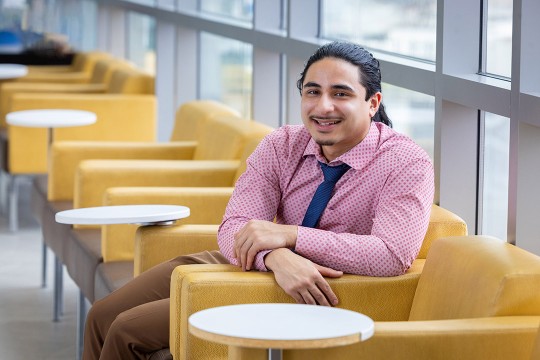
Work experience and people skills give exercise science graduate a leg up
With aspirations to work for the NFL, Gabe McMurtrie’s interest in athletic performance made RIT’s exercise science program a natural fit, giving him a strong foundation in human mechanics, physiology, and sport psychology.
-
March 20, 2025

Global public health class takes field trip to Dominican Republic
RIT students enrolled in a global public health class spent a weeklong field trip in the Dominican Republic examining healthcare and emergency services.
-
July 26, 2024

Siblings explore the Mediterranean diet in Greece
When David, a third-year exercise science major, heard about the study abroad program offered through RIT Global, he was determined to go and to take his sister with him. In June, the Brassies left for the six-week program at Perrotis College, where they would study the Mediterranean diet and Greek culture.
Contact
- William Brewer
- Director of Exercise Science Program
- Wegmans School of Health and Nutrition
- College of Health Sciences and Technology
- wsbscl@rit.edu
Wegmans School of Health and Nutrition











